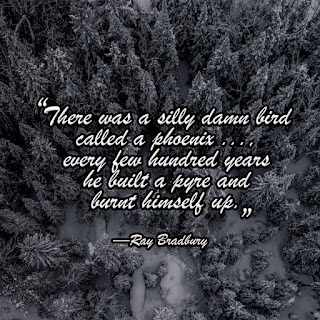Citations & Reference:"This is what I have heard from Hans Christian Andersen," the Moon chattered after saying Basmalah and Salaam. "But pardon me, I can't maintain exactly what he has mentioned. I'm trying to rember of his words,In the Garden of Paradise, beneath the Tree of Knowledge, bloomed a rose bush. Here, in the first rose, a bird was born : his flight was like the flashing of light, his plumage was beauteous, and his song ravishing.But when Eve plucked the fruit of the knowledge of good and evil, when she and Adam were driven from Paradise, there fell from the flaming sword of the cherub—an angel of the second highest order of the ninefold celestial hierarchy, represented in ancient Middle Eastern art as a lion or bull with eagles' wings and a human face—a spark, into the nest of the bird, which blazed up forthwith. The bird perished in the flames ; but from the red egg in the nest there, fluttered aloft a new one, the one solitary Phoenix bird. The fable tells us that he dwells in Arabia—the Land which the tadpoles hate—and that every year, he burns himself to death in his nest ; but each time a new Phoenix, the only one in the world, rises up from the red egg.The bird flutters round us, swift as light, beauteous in colour, charming in song. When a mother sits by her infant's cradle, he stands on the pillow, and, with his wings, forms a glory around the infant's head. He flies through the chamber of content, and brings sunshine into it, and the violets on the humble table, smell doubly sweet.But lately, the Phoenix, evidently, is not the bird of Arabia alone. He wings his way in the glimmer of the northern lights, over the plains of Lapland, and hops among the yellow flowers in the short Greenland summer. Beneath the copper mountains of Fahlun, and England's coal mines, he flies, in the shape of a dusty moth, over the hymn-book that rests on the knees of the pious miner. On a lotus leaf, he floats down the sacred waters of the Ganges, and the eye of the Hindoo maid, gleams bright, when she beholds him.The Phoenix bird, dost thou not know him? The Bird of Paradise, the holy swan of song ! On the car of Thespis—an Ancient Greek poet who first person ever to appear on stage as an actor playing a character in a play—he sat in the guise of a chattering raven, and flapped his black wings, smeared with the lees of wine ; over the sounding harp of Iceland, swept the swan's red beak ; on Shakespeare's shoulder, he sat in the guise of Odin's raven, and whispered in the poet's ear "Immortality!" and at the minstrels' feast, he fluttered through the halls of the Wartburg.The Bird of Paradise renewed each century born in flame, ending in flame ! Thy picture, in a golden frame, hangs in the halls of theflavorful rich employers; and thou, thyself, often fliest around, lonely and disregarded, a myth "The Phoenix belongs to the Arabian.""Perhaps, I did not properly narrate it," I talked to a brilliant philosopher. And, as Allah's will, I'll tell you, what was his comments. And Allah knows best.
- H.W. Dulcken, Ph. D, What the Moon Saw and Other Tales by Hans C. Andersen, George Routledge and Sons.

